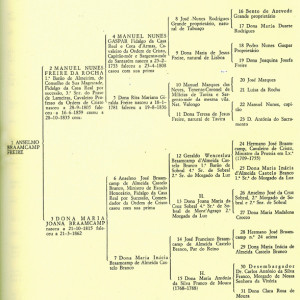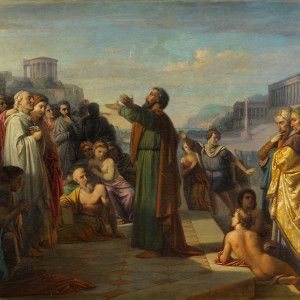When pro-lifers refer to the unborn child as a child, we get accused of playing games with language. The opposite is true, as Ramesh Ponnuru pointed out (fairly) recently. Originally the word “child” referred only to unborn children. From the Online Etymology Dictionary: child (n.) Old English cild “fetus, infant, unborn or newly born person,” from Proto-Germanic *kiltham (cf.… Continue reading The Unborn Child is a Child. Literally.
Author: Joe Heschmeyer
Ten Facts About the Assumption of Mary That You May Not Know
Today is the Solemnity of the Assumption of the Blessed Virgin Mary, one of the most important feasts of the year. Here are some facts of about today’s feast that you may not know: José Benlliure y Gil, Mass in the Chapel (1871) 1. Today is a Holy Day of Obligation: Outside of Sundays, American Catholics… Continue reading Ten Facts About the Assumption of Mary That You May Not Know
How Train Cars and Set Theory Prove the Existence of God
Perhaps the strongest argument against atheism is the argument from contingency. In its barest form, it goes something like this: A. All of reality, without exception, breaks down into one of two possible categories: (1) that which is contingent, and (2) that which is non-contingent. Let me explain what I mean by both the terms,… Continue reading How Train Cars and Set Theory Prove the Existence of God
Waiting on the Lord: A Lesson from the Book of Judith
The Book of Judith is read altogether too rarely. Protestants don’t have it in their Bibles, and many Catholics do, but wouldn’t know it. But it illustrates, quite vividly, the importance of holding fast to God. This depiction comes from the seventh and eighth chapter of Judith, during the course of Holofernes’ campaign against the… Continue reading Waiting on the Lord: A Lesson from the Book of Judith
Hey, Hays, Kansas!
St. Paul in Athens (19th c.) I’m coming your way today! I’m giving a talk tonight on “The Digital Town Square: How Social Media is Changing the Face of Catholicism.” Here’s the description that was in the bulletin: “Joe Heschmeyer, Shameless Popery blogger and Seminarian for the Archdiocese of KC, discusses how the internet enables… Continue reading Hey, Hays, Kansas!
The Single Best Argument Against Philosophical Materialism?
Robert Ritchie, commenting on Wednesday’s post refuting philosophical materialism, raised another important line of argumentation: that we can see that philosophical materialism is false because of “the reliability of our cognitive functions.” Ritchie described the argument as “exceedingly powerful,” and “for my money, is the best single argument against materialism.” I’ll let you be the judge… Continue reading The Single Best Argument Against Philosophical Materialism?
Does the Immaterial Exist?
One of the most common arguments from atheists is that matter is all that there is, and that the immaterial (God, angels, the human soul, etc.) simply doesn’t exist. This position is generally called “philosophical materialism,” although that term encompasses a number of distinct positions. In any case, here’s one of the clearest presentations of… Continue reading Does the Immaterial Exist?
The First- and Second-Century Papacy: An Answer to Eamon Duffy
One of the most surprising attacks on the papacy has come from Eamon Duffy, a professor of the history of Christianity at Cambridge University. Duffy’s argument is that not only was the Bishop of Rome not considered the pope in the early days of Christianity, but that there was no Bishop of Rome for nearly… Continue reading The First- and Second-Century Papacy: An Answer to Eamon Duffy
Have You Wept Over the Death of Immigrants?
Last week, Pope Francis visited the small Sicilian island of Lampedusa, a crossing-over point for immigrantscoming from northern Africa to Europe. He went to mourn the deaths of an estimated 20,000 migrants who have crossed over. These individuals were mostly Muslims who were crossing into Europe illegally, and their deaths were largely ignored. The pope’s trip… Continue reading Have You Wept Over the Death of Immigrants?
Why Non-Christians Should Read Lumen Fidei
On Friday, Pope Francis released his first encyclical, Lumen Fidei, which means “The Light of Faith.” Even though the encyclical is addressed to “the bishops, priests, and deacons, consecrated persons, and the lay faithful,” I hope that non-Christians will read it as well. Why? Because Francis explains in stark terms the differences in how “faith”… Continue reading Why Non-Christians Should Read Lumen Fidei









